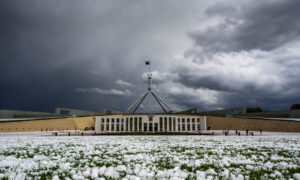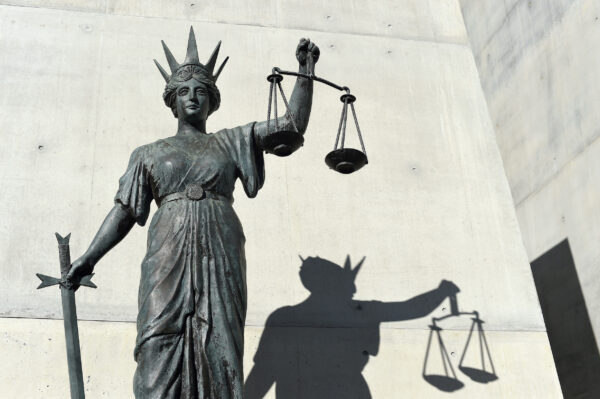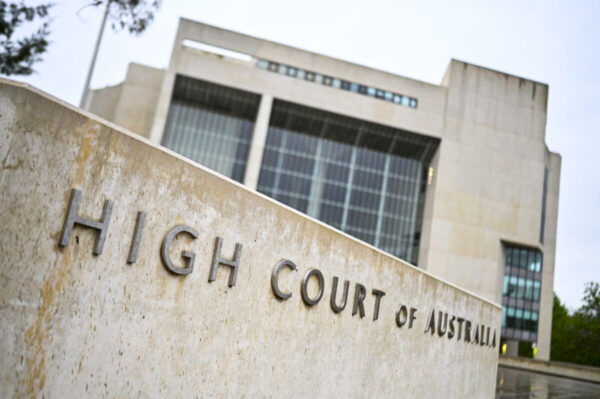How Concentration of Powers Undermines the Rule of Law in Australia
Commentary Over the last three years, the Australian government has exercised coercive powers over its citizens on a scale never previously attempted. At some moments, it took oppressive control over almost every aspect of our personal lives: where we could go, whom we could meet, what we could do even within our own homes. Australians believed to have violated COVID-19 guidelines could have been arbitrarily punished with little regard for the rule of law and its impact on fundamental human rights. The ideal of legality, known as the rule of law, can be traced to the ancient Greeks. For example, Aristotle argued that “it is better for the law to rule than one of the citizens, so even the guardians of the laws are obeying the laws.” As aptly stated by the late Sir Owen Hood Phillips, who was a jurisprudence professor, “historically, the phrase was used with reference to a belief in the existence of law possessing higher authority—whether divine or natural—than that of the law promulgated by human rulers which imposed limits on their power.” According to Trevor Allan, a legal philosophy professor at Cambridge, the rule of law encompasses “traditional ideas about individual liberty and natural justice and, more generally, ideas about the requirements of justice and fairness in the relations between governors and governed.” A statue of Themis, the Greek God of Justice, stands outside the Supreme Court in Brisbane, Australia, on Oct. 20, 2016. (AAP Image/Dave Hunt) That being so, Allan concludes that even if, from their perspective, officials are acting with good faith and in the public’s interest: “It would be foolish to ignore or deny the real threat to liberty that discretionary powers represent; they leave the citizen at the mercy of the judgement of public officials, who may have little incentive to allow even reasonable objections to thwart their pursuit of their own policy agendas.” Power and Its Corruption Unfortunately, however, writes Mortimer Sellers, a law professor and past president of the International Association for Philosophy of Law and Social Philosophy, “Advocates of rule by law sometimes undermine the rule of law by legitimating the enactments of tyrants. Positive laws may sometimes be an advance on otherwise unregulated tyranny. Promulgations and the other virtues of legal formalism often advance the empire of laws. But they are only secondary and contingent requirements of the rule of law, not the thing itself.” It has long been held that prevention against tyranny requires an effective separation of legislative, executive, and judicial powers. The idea rests on the view that when power becomes too concentrated in the hands of a few, the risk of tyranny naturally increases. In the words of Sir Ivor Jennings, “All power is likely to be abused unless it is adequately checked.” This is, it must be stressed, a problem of unchecked power, and here we are reminded of Lord Acton’s warning: “Power tends to corrupt and absolute power corrupts absolutely.” To restrain the abuse of power, Montesquieu, one of the great political philosophers of the Enlightenment, wrote, “it is necessary from the disposition of things that power should be a check to power.” According to him, “When the legislative and executive powers are united in the same person, or in the same body of magistrates, there can be no liberty; because apprehensions may arise, lest the same monarch or senate should enact tyrannical laws, to execute them in a tyrannical manner.” Fusion of Power In Australia, the present design and operation of the nation’s parliamentary system are not about distributing institutional powers, thus making accountability difficult to achieve. Under our parliamentary system of government, there is no separation of powers. Such a vast concentration of power in the hands of a few naturally facilitates the enactment of legislation that undermines the realisation of the rule of law. As stated by constitutional law professor Nicholas Aroney: “Under contemporary conditions of [Australia’s] parliamentary government, there is a tendency for both executive and legislative power to be concentrated effectively in a very small group of senior ministers, dominated by the prime minister or premier.” A general view of the High Court of Australia in Canberra, Australia, on Nov. 5, 2020. (AAP Image/Lukas Coch) To make it worse, according to another constitutional law professor, Suri Ratnapala, “the High Court, despite having full judicial power, has declined to impose on Parliament any significant constraint on its competence to delegate its legislative power to the executive.” Pointing to decisions such as Victorian Stevedoring & General Contracting Co Ltd v Dignan, Ratnapala laments how the courts have chosen to not “draw the line in the sand against excessive delegation” despite functional “parliamentary democracies relying heavily on judicial oversight of executive action.” As can be seen, there

Commentary
Over the last three years, the Australian government has exercised coercive powers over its citizens on a scale never previously attempted.
At some moments, it took oppressive control over almost every aspect of our personal lives: where we could go, whom we could meet, what we could do even within our own homes.
Australians believed to have violated COVID-19 guidelines could have been arbitrarily punished with little regard for the rule of law and its impact on fundamental human rights.
The ideal of legality, known as the rule of law, can be traced to the ancient Greeks. For example, Aristotle argued that “it is better for the law to rule than one of the citizens, so even the guardians of the laws are obeying the laws.”
As aptly stated by the late Sir Owen Hood Phillips, who was a jurisprudence professor, “historically, the phrase was used with reference to a belief in the existence of law possessing higher authority—whether divine or natural—than that of the law promulgated by human rulers which imposed limits on their power.”
According to Trevor Allan, a legal philosophy professor at Cambridge, the rule of law encompasses “traditional ideas about individual liberty and natural justice and, more generally, ideas about the requirements of justice and fairness in the relations between governors and governed.”

That being so, Allan concludes that even if, from their perspective, officials are acting with good faith and in the public’s interest:
“It would be foolish to ignore or deny the real threat to liberty that discretionary powers represent; they leave the citizen at the mercy of the judgement of public officials, who may have little incentive to allow even reasonable objections to thwart their pursuit of their own policy agendas.”
Power and Its Corruption
Unfortunately, however, writes Mortimer Sellers, a law professor and past president of the International Association for Philosophy of Law and Social Philosophy,
“Advocates of rule by law sometimes undermine the rule of law by legitimating the enactments of tyrants. Positive laws may sometimes be an advance on otherwise unregulated tyranny. Promulgations and the other virtues of legal formalism often advance the empire of laws. But they are only secondary and contingent requirements of the rule of law, not the thing itself.”
It has long been held that prevention against tyranny requires an effective separation of legislative, executive, and judicial powers. The idea rests on the view that when power becomes too concentrated in the hands of a few, the risk of tyranny naturally increases.
In the words of Sir Ivor Jennings, “All power is likely to be abused unless it is adequately checked.”
This is, it must be stressed, a problem of unchecked power, and here we are reminded of Lord Acton’s warning: “Power tends to corrupt and absolute power corrupts absolutely.”
To restrain the abuse of power, Montesquieu, one of the great political philosophers of the Enlightenment, wrote, “it is necessary from the disposition of things that power should be a check to power.”
According to him,
“When the legislative and executive powers are united in the same person, or in the same body of magistrates, there can be no liberty; because apprehensions may arise, lest the same monarch or senate should enact tyrannical laws, to execute them in a tyrannical manner.”
Fusion of Power
In Australia, the present design and operation of the nation’s parliamentary system are not about distributing institutional powers, thus making accountability difficult to achieve.
Under our parliamentary system of government, there is no separation of powers. Such a vast concentration of power in the hands of a few naturally facilitates the enactment of legislation that undermines the realisation of the rule of law.
As stated by constitutional law professor Nicholas Aroney: “Under contemporary conditions of [Australia’s] parliamentary government, there is a tendency for both executive and legislative power to be concentrated effectively in a very small group of senior ministers, dominated by the prime minister or premier.”

To make it worse, according to another constitutional law professor, Suri Ratnapala, “the High Court, despite having full judicial power, has declined to impose on Parliament any significant constraint on its competence to delegate its legislative power to the executive.”
Pointing to decisions such as Victorian Stevedoring & General Contracting Co Ltd v Dignan, Ratnapala laments how the courts have chosen to not “draw the line in the sand against excessive delegation” despite functional “parliamentary democracies relying heavily on judicial oversight of executive action.”
As can be seen, there is no real or authentic separation of powers in Australia. In fact, even judges are not entirely independent since they are ultimately appointed by the ruling political class.
Furthermore, Section 64 of the Australian Constitution requires executive ministers to be Members of Parliament, a provision that undermines the separation of powers and that is, therefore, in sharp contrast to Article 1, sec. 6, cl. 2 of the United States Constitution.
To conclude, the nation’s parliamentary system of executive supremacy lies at the very heart of a system of government that authorises a vast concentration of powers with respect to legislation and administration.
The negative consequence of this fusion of legislative-executive powers is demonstrated by the lack of proper judicial scrutiny of executive decrees that violates the most basic principles of the rule of law.
Coupled with a matrix of social institutions (political parties, legal associations, the media, etc.), they have miserably failed to keep the Australian government more accountable for its incursion on the people’s basic rights.
Views expressed in this article are the opinions of the author and do not necessarily reflect the views of The Epoch Times.












